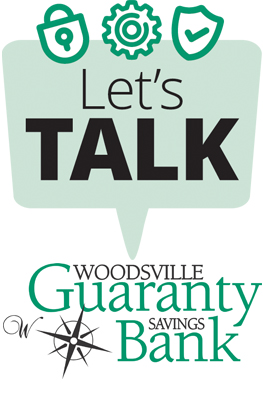Red Flags for Fraud
Fraudsters are smart. They are also highly skilled at adapting their methods to improve their success with victims. Whatever the approach, scams share common elements that can serve as red flags to warn potential victims of danger.
Woodsville Guaranty Savings Bank wants to help you recognize the red flags for fraud and help you protect yourself from scams.
When you hear or see one (or more) of these red flags or anything unusual, stop, think, and stop fraud from happening to you. If you think you may have shared personal information with a fraudster, call the bank right away. There are things we can do to help protect you from fraud.
Top 10 Red Flags for Fraud
- Someone sends you a check or electronic deposit, and asks you to wire some of the money to someone else.
- Never send money by wire or other money transfer method to someone you don’t know well and have not met personally. If you receive a check or deposit in this way, it’s likely fraudulent. These requests are often made by online friends or love interests, or by someone who says they want to buy something you’re selling online. If someone asks you to do this, say no.
- A caller asks you to give them remote access to your computer so they can fix a problem for you (or issue you a credit).
- Never give access to your computer to anyone contacting you by phone unless you initiated the call for support from a legitimate company. If someone asks you for this, say no and hang up.
- You receive a call, email, or text that suggests you or a family member are in trouble and you need to send money quickly.
- Fraudsters often use fear to pressure victims into acting before they can talk to anyone else and think it through. The scammer may claim to be with law enforcement or a government agency, or they may say they’re calling on behalf of a family member who they say is hurt, sick, or in danger. Whatever the story, if you are contacted by someone who threatens you and tells you to send money or confirm personal information “immediately”, don’t do it.
- A caller asks you for your account number, debit card number, Social Security number, PIN number, or online banking password.
- Never give account or Social Security numbers to anyone, unless you initiated the contact, and never share login credentials for online banking or PIN numbers with anyone.
- Someone tells you to purchase gift cards or bitcoin to send money or pay a debt.
- Honest people, companies, and organizations will not ask you to send money using gift cards or bitcoin. If someone pressures you to send money in this way, hang up.
- You are told you won a lottery or inherited money, but need to pay taxes or a fee to get it.
- While lottery winnings and inheritances do come with tax obligations, recipients of money from legitimate sweepstakes or wills/estates will not be asked to pay those taxes up front. Never send money to someone you don’t know with the promise that you’ll get more money in return.
- You receive an unexpected email or text that includes an attachment or link.
- Phishing emails look like they’re from a trusted or recognized source, like your bank, a government agency, a personal friend or business relationship, or an online store. The email may include a link to update or provide personal information or verify a transaction. Commonly, the link or attachment are malicious and let the bad actor infect your computer or mobile device and access your personal information. If you’re not absolutely sure that the email is legitimate, contact the sender directly via a number or website you know to be true. Never call a phone number that’s included in a suspicious email and don’t reply to the email.
- During a discussion about going to the bank, you are told what to say and what not to say to bank employees about the source of a deposit or the recipient of a wire.
- Bank employees work hard to protect customers from fraud, and fraudsters know this. If you are asked to cover-up any facts about a deposit, wire, or withdrawal, it’s likely fraud. Always feel free to talk with bank staff about your transactions. You can trust them to steer you in the right direction and away from fraud.
- You see an offer or something for sale on social media or other online location with a “too good to be true” promise or price.
- If it seems too good to be true, it probably is. Social media is an attractive place for fraudsters to lure consumers with deals and opportunities that look fantastic, but fail to deliver or, worse, simply use your personal card information for malicious purposes.
- You receive a debit card, bank statement, or loan documents in the mail for an account you did not open.
- Fraudsters need accounts to receive stolen money and often open these accounts using stolen personal information. If you receive mail about an account you did not open, contact the appropriate bank or lender quickly, then contact us. There are things we can do to help protect you and your Woodsville Guaranty Savings Bank accounts from fraud.
